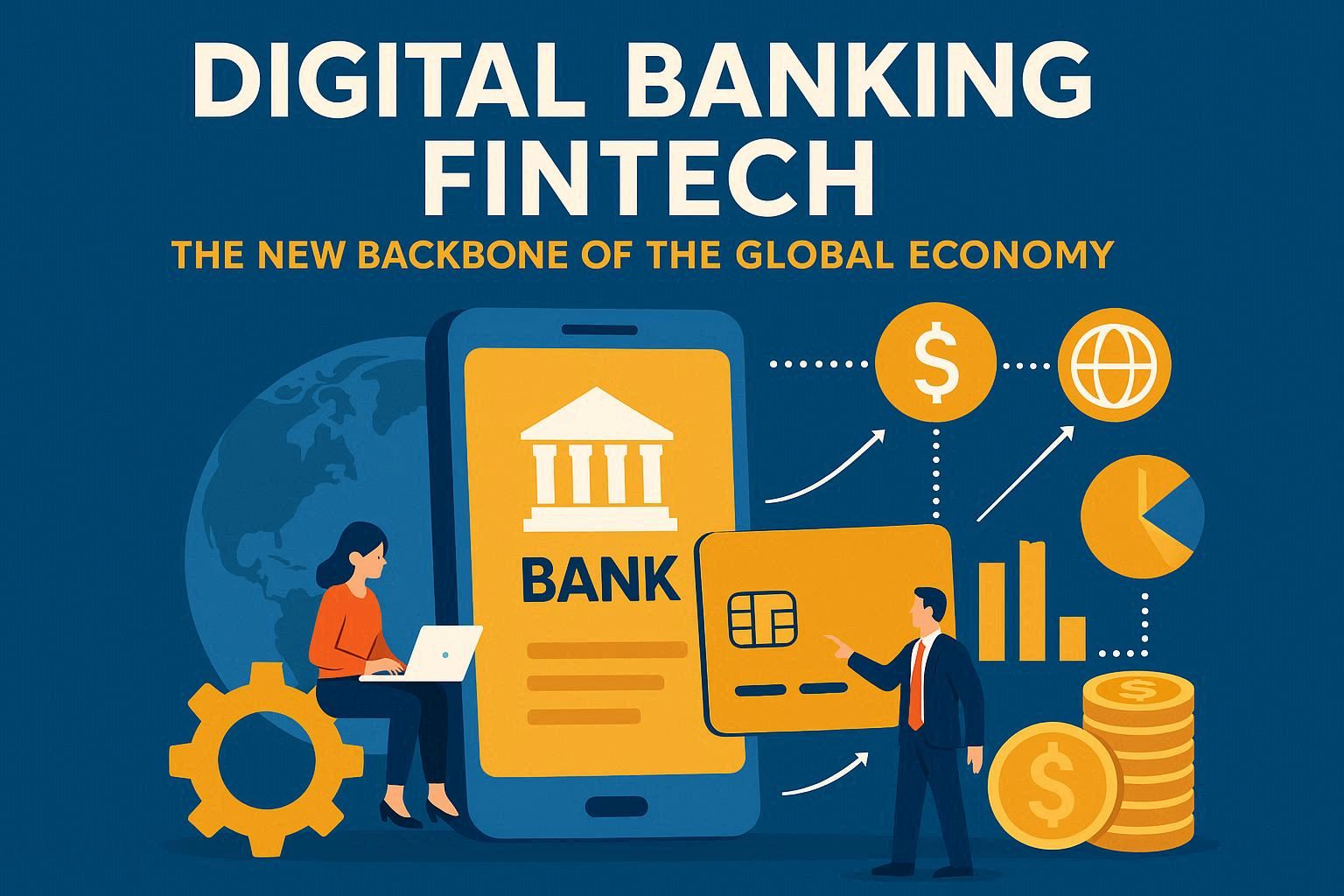Introduction
Money has always been the backbone of economic activity, but in 2025, the way we use and manage money is changing rapidly. From digital wallets to mobile-only banks, financial technology—or fintech—is transforming how individuals and businesses interact with the global economy. The rise of digital banking is not just a convenience; it is reshaping entire financial systems, creating new opportunities, and presenting unique challenges.
This article explores the evolution of digital banking and fintech, their role in driving global economic growth, the benefits and risks they present, and what the future of finance may look like as technology continues to advance.
1. What Is Digital Banking and Fintech?
Digital banking refers to financial services delivered primarily through digital platforms—mobile apps, websites, and online portals—without the need for traditional physical branches. Fintech (financial technology) goes a step further, covering innovative startups and technologies that offer faster, smarter, and more inclusive financial services.
Examples include mobile wallets like PayPal and Apple Pay, investment apps like Robinhood, peer-to-peer lending platforms, and even blockchain-powered solutions. Together, digital banking and fintech are disrupting the financial sector by prioritizing speed, accessibility, and customer experience.
2. The Growth of Digital Banking in 2025
Several factors explain the rapid rise of digital banking:
- Shift to Mobile-First Economies – In many countries, people skipped traditional banking entirely, moving directly to mobile apps.
- Pandemic Acceleration – COVID-19 forced millions to adopt online payments and banking, accelerating long-term digital adoption.
- Cost Efficiency – Digital banks save money by eliminating branches, allowing them to offer lower fees and higher interest rates.
- Global Connectivity – Cross-border payments and digital wallets make it easier for workers, freelancers, and businesses to operate internationally.
3. Benefits of Digital Banking and Fintech
The shift to digital brings many advantages to individuals, businesses, and economies:
- Accessibility – People in remote areas can access financial services without physical branches.
- Speed and Convenience – Transactions, loans, and investments can be processed within minutes instead of days.
- Lower Costs – Reduced overhead means lower fees for customers and better services for businesses.
- Financial Inclusion – Millions of unbanked people now have access to digital wallets and mobile-based banking solutions.
- Innovation – Startups continue to introduce creative services such as microloans, robo-advisors, and AI-driven financial planning.
4. Risks and Challenges of Digital Finance
Despite its promise, digital banking also brings new challenges:
- Cybersecurity Threats – Hackers and data breaches pose risks to customers’ sensitive financial information.
- Over-Reliance on Technology – Outages, software bugs, or system failures can disrupt financial activity.
- Regulation Issues – Governments struggle to regulate fast-moving fintech innovations without stifling growth.
- Exclusion Risks – People without smartphones or internet access may be left behind.
Balancing innovation with consumer protection will remain a key challenge for policymakers in 2025 and beyond.
5. The Role of Fintech Startups
Fintech startups are at the heart of this transformation. Unlike traditional banks, they are agile, innovative, and customer-focused. Some examples of fintech’s impact include:
- Peer-to-Peer Lending – Platforms connect borrowers directly with investors, bypassing banks.
- Neobanks – Fully digital banks like Revolut and Chime offer services without any physical branches.
- Cryptocurrency Exchanges – Platforms like Coinbase and Binance provide access to digital assets.
- Robo-Advisors – Automated platforms help people invest with minimal fees and expert-level strategies.
By focusing on user experience and leveraging technology, fintech startups have created a new level of competition that forces traditional banks to innovate or risk losing customers.
6. The Global Economic Impact
Digital banking and fintech are not just reshaping financial services—they are impacting the global economy in several ways:
- Boosting Entrepreneurship – Easier access to small business loans and global payment solutions helps startups thrive.
- Empowering Freelancers – Cross-border payment systems enable gig workers to earn income internationally.
- Encouraging Investment – More people can participate in stock markets and crypto markets thanks to low-cost investment platforms.
- Improving Efficiency – Digital finance reduces transaction costs and increases the speed of global trade.
7. Regulation and Consumer Protection
Governments worldwide are grappling with how to regulate fintech. Too much regulation may stifle innovation, but too little creates risks for consumers. Key areas of focus include:
- Protecting users from fraud and identity theft.
- Creating fair competition between banks and fintech startups.
- Managing risks associated with cryptocurrency and decentralized finance (DeFi).
- Ensuring fair access for all citizens, not just those with advanced technology.
Striking the right balance will determine whether fintech strengthens economies or creates instability.
8. The Future of Digital Banking and Fintech
Looking ahead, fintech is expected to become even more powerful. Some future trends include:
- AI-Powered Banking – Artificial intelligence will predict spending habits, detect fraud instantly, and provide personalized financial advice.
- Blockchain Integration – Transparent and secure systems for transactions, identity verification, and smart contracts.
- Cashless Societies – Many countries are moving toward economies where physical cash is rarely used.
- Open Banking – Financial institutions will share customer data (with consent) to enable tailored services across platforms.
By 2030, digital banking may dominate the financial sector, with traditional branch-based banking becoming the exception rather than the rule.
Conclusion
Digital banking and fintech are no longer niche trends—they are the new backbone of the global economy. By making financial services faster, more affordable, and more inclusive, they are transforming lives and opening doors to new economic opportunities. At the same time, the rise of digital finance brings risks that require careful management, from cybersecurity to regulatory oversight.
For individuals, embracing digital banking means gaining control, convenience, and access to a broader range of financial services. For businesses and governments, it means adapting to a new financial reality where technology sets the pace. In the years ahead, those who adapt quickly will thrive in this new digital financial era.

